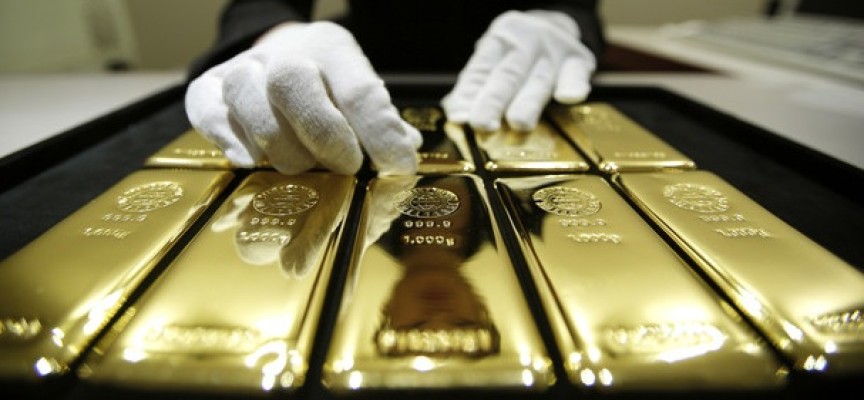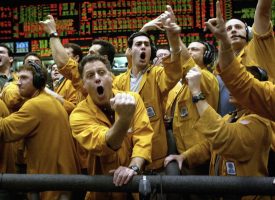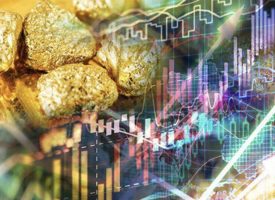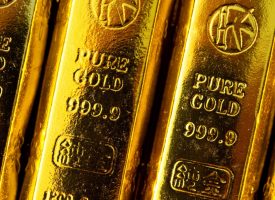Today a legend who was recently asked by the Chinese government to give a speech to government officials in China warned King World News that the global gold rush is now set to intensify as currency wars rage and China moves to dominate the world. John Ing, who has been in the business for 43 years, also warned that more Western central banks will move to repatriate their gold as faith is lost in the United States government.
By John Ing of Maison Placements
December 19 (King World News) – Policymakers continue to take the easy option of running massive budgets and current account deficits, racking up record large amounts of debt hidden beneath the market’s buoyancy. This is wrong. The disconnect between the record stock prices and the economic realities on the other hand cannot last. It is not so different this time….
Continue reading the John Ing piece below…
Advertisement
To hear which company is the highest grade silver producer in the world
located in one of the most mining friendly countries and
offers investors massive blue sky click on the logo:

For example, currency mercantilism is a central plank of central banks today. The president of the European Central Bank (ECB), Mario Draghi, recent jawboning kicked the can down the road again but the euro collapsed. Prime Minister Abe of Japan, unleashed quantitative easing to infinity to get the yen down. South Korea’s won also suffered. China too reduced interest rates prompting a reversal of the renminbi after eight years of increases.
We believe that the currency devaluations are a blatant attempt to boost exports in the hope that current account surpluses will help their economies. The risk is that this stealth currency war spreads repeating the Brazil, Russia, India and China (BRIC) debacle in the late nineties. So far the dollar has been supported by quantitative easing but the Republicans’ ambition to force Obama to abandon his free spending ways is likely to cause a lower dollar and higher inflation.
Since Bretton Woods, global currencies have floated against the dollar. The world is awash with some $70 trillion fueled by the Federal Reserve’s balance sheet which has exploded to a record $5 trillion, a liability of the state. Despite the rhetoric of austerity, America will spend $1.1 trillion with another budget deficit. As a result, America’s creditors are looking for alternatives to the outdated US hegemony regime. China has curtailed their dollar purchases in a diversification move.
How Fortunes Change
Saudi Arabia and OPEC are gambling that lower prices will inflict more pain on US shale players than themselves. The global oil collapse has threatened their regional foes increasing geo-political risk, but not just in the usual trouble spots, shifting economic power away from oil exporters. Cheap fuel will help the consuming states. However unintended consequences have opened on two fronts at once. One front sees the larger players like Russia and the big Latin American players in big trouble because their operating budgets are heavily dependent on higher oil revenues. Currencies of the big oil exporters from Mexico to
Canada to Venezuela hit multi year lows against the dollar. The Russian ruble fell 50 percent to the lowest level ever despite attempts to prop up the beleaguered currency. Near term, Russia is the biggest loser as are its creditors, the big European banks. Dominoes anyone? The financialization of oil also engulfed other players which could backfire on those sovereign players including the Middle East players themselves. Algeria, Iraq, Libya and Nigeria are fighting out-of-control sectarian wars and are heavily dependent on higher oil prices. OPEC is taking a big gamble by opening the barn door.
The drop in oil opened a third front, reversing a trend that saw the oil producers provide liquidity to a highly leveraged financial system from hotels to equities and of course US Treasuries. An unintended consequence is Wall Street who financed the oil explosion taking advantage of free money. Combined with lower energy prices, the overleveraged American oil producers, backed by the big private players and Wall Street, are to be the next major casualties. In the seventies, low oil prices almost tipped the world into hyperinflation. We believe the financialization of oil exposes the global banks’ leveraged position, which will unnerve financial markets. Ironically while the big international banks were too busy colluding and fixing other markets, their inattention has done more harm than good.
The World’s Second Largest Economy
The rise of China and America’s road to decline surfaced at the APEC summit in Beijing. China’s economy will soon overtake America, becoming the world’s largest economy. This should be a wake-up call and many are wondering if the two can exist in the same bathtub. Of course both can share the bathtub and in fact China’s growth and capital will be the major driver to the world’s economy as China grows its middle class. Savings and investment currently make up close to 50 percent of GDP.
We believe China’s abundant capital, state capitalism and economic clout will be centered on the greater use and internationalization of the renminbi. A tempo of reform, financial deregulation and “going out” strategy are part of Mr. Xi’s structural reform plans. However, as China expands its sphere of influence, it wants a larger role in international institutions, using its rising economic strength to secure its financial ambitions.
To date, they have set up three development banks such as the Asian Infrastructure Investment Bank. China’s ambition to become a major player in the world’s trading and financial systems will require infrastructure networks or alliances with neighboring countries. To be sure, China’s largest trading partners are now its neighbors where the Chinese renminbi is watched more closely than the American dollar.
China gobbled up the world’s coal, oil and now gold fueling its booming economy. China is the largest producer of gold in the world as well as the largest consumer of gold. Already stuffed with paper obligations like US Treasuries and asset backed securities, China has expressed concern over what underpins and protects their $4 trillion hoard. Thus when China buys gold it protects them from a volatile dollar. To be sure, the Republicans too are distrustful of big government and the role of the printing press in cheapening its currency. The recent swing in the midterm elections strengthened the Republican party, who clearly favor the greater use of gold. Rand Paul’s father has been a proponent of not only boosting gold reserves but also auditing Fort Knox, whose last audit was when President Eisenhower was in power.
Gold Rush
After the Swiss rejection, gold collapsed in a free fall to $1,142 an ounce as Hong Kong and “Johnny come lately” hedgers dumped gold retesting the old lows but in less than 24 hours recaptured its losses in a stunning $70 an ounce turnaround in a classic physical short squeeze. There was also an option expiry which coincided with one of the largest backwardations in history. Investors, it seems were willing to pay more for gold today than tomorrow. But when they came in Monday morning, there was a scramble for physical gold in part due to the Chinese soaking up physical supplies. In one week alone, about 55 tonnes was taken up on the Shanghai Gold Futures Exchange (SGE).
Lately gold has been relegated to the doghouse in part because of its so-called failure to lift following Middle East tensions and recently the Swiss rejection. More relevant however is that neither factor was behind gold’s performance. We believe the fundamentals have long pointed to higher gold prices. Gold is a barometer of investor anxiety influenced by a multitude of factors. In the seventies it was inflation.
Gold’s current bull run of twelve years was due to global monetary easing prompting strong physical buying by central banks and investor demand despite the absence of inflation. Critics also don’t like gold because they can’t value gold. Gold’s valuation is subjective. Its value is the sum of investor demand. It is an alternative store of value to currencies. Since the 2008 financial crisis, gold is up some 62 percent while the so-called record breaking equity market is only up 27 percent. The long term narrative, however remains the same. The unprecedented monetization of America’s record debt cannot be done painlessly and without consequences.
As such, we believe more and more central banks are repatriating their gold in an old fashioned “run on the bank”. Belgium is the latest bank to request the return of its gold in the belief that ownership is nine- tenth of the law. There are too many fiat-based currencies sloshing around and gold’s role in central banks’ reserves has become more and more important. Venezuela got their gold back to shore up its weakened treasury. The Dutch serendipitously repatriated 123 tonnes of gold from America. The Germans also wanted to repatriate their gold, but were told that it will take seven years. Even the French are musing about a recall of their gold in an old fashion gold rush.
Central banks are buying gold and in some cases recalling their reserves because of their distrust and worry that the dollar’s role as a reserve currency protects America and not them. In the third quarter, central banks bought almost 100 tonnes and will likely have purchased some 500 tonnes this year. The US dollar is a faith-based fiat currency and the dollar’s “exorbitant privilege” is being questioned by its creditors. Last year, some nineteen central banks bought gold. Indeed, Russia has expanded its gold holdings for the seventh straight month, adding 18.9 tonnes for a total 1,169 tonnes, making them the fifth largest holder in the world. With only 10 percent of GDP in debt, Russia is building up reserves as a hedge against the dollar and the possibility that new financial sanctions might freeze their dollar holdings.
History shows gold is an anchor at a time of currency wars and protection against defaults. Defaults? In July, Argentina defaulted for the second time in thirteen years. Russia’s ruble is lower than when they last defaulted in 1999. And four years later after two separate rescues, Greece still needs EU support. Plus ca change… Gold is the antidote in an overvalued world kept afloat by too much debt. It is easily exchangeable into other currencies, a store of value and a hedge against central banks propensity to print money to finance profligate governments.
Neither a lender….
“Neither a lender nor a borrower be”, said Polonius in Act I, Scene 3 of William Shakespeare's Hamlet. Notwithstanding that derivatives almost crashed the system in 2008, along with a too-easy monetary policy and underlying mortgage crisis, derivatives are bigger today. Gold remains a central activity for central banks for both collateral and reserve purposes. Also quantitative easing has soaked up quality treasuries or mortgage bonds as collateral and over time there developed a shortage of collateral. As such, central bankers consider gold a viable collateral replacement.
The big banks became the handmaidens of the central banks dating back when hedging was in full swing. Central banks loaned gold to the bullion banks to lend to the gold producers. The bankers used that gold on loan for better uses, as collateral for their paper obligations. The business soon imploded when the producers flattened their toxic hedges. Comex was the central character then and today the markets have caught up to the fact that there are too many paper obligations against not enough physical collateral. There is no Santa Clause.
Sounds familiar? This is the genesis for the trillions of derivatives circulating today. And now, the establishment of a rival market in Asia, the Shanghai Gold Exchange adds another factor in the physical market as gold moves from the West to the East. We believe that the reversal of the hedges, China’s insatiable appetite for physical and central banks repatriation has caused a shortage of physical gold. That is a better narrative.
****UPDATE – KWN readers need to update the bookmarks of the King World News home page to www.kingworldnews.com
© 2014 by King World News®. All Rights Reserved. This material may not be published, broadcast, rewritten, or redistributed. However, linking directly to the blog page is permitted and encouraged.
The audio interviews with Stephen Leeb, Andrew Maguire, John Embry, Gerald Celente, Rick Rule, Bill Fleckenstein, Ben Davies, Greyerz-Turk-Stamm, David Stockman, William Kaye, Eric Sprott, Rick Santelli, John Mauldin and Marc Faber are available now. Other recent KWN interviews include Jim Grant and Felix Zulauf — to listen CLICK HERE.







